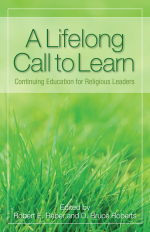 |
| A Lifelong Call to Learn: Continuing Education for Religious Leaders,ed. by Robert E. Reber and D. Bruce Roberts(Alban Institute, 2010, 398 pp., $22). |
No one knowledgeable about contemporary congregational life would argue that pastoral leadership can be left to amateurs — or even to the well-intentioned. But it's quite another matter to determine how best to cultivate exceptional pastors, whether ordained or lay. For some observers, effective pastoral training means providing students with plenty of information — enough knowledge for when they are out in the real world of ministry. For others, it means equipping pastoral ministers as if they were the CEOs of small companies. In between are all those congregations and parishes looking for good preachers or charismatic teachers or skilled administrators — gifts that may not in themselves foster vital faith communities.
Robert Reber and Bruce Roberts have assembled a very helpful collection of essays that should be part of any discussion about competent pastoral leadership. A Lifelong Call to Learn provides a sustained argument for the role that continuing education plays in helping the church achieve its noblest goals. The book has been revised and expanded from its original publication in 2001, so trustees, administrators, faculty, and denominational officers who missed the first edition have the chance to correct their oversight.
Continuing education for ministry suffers benign neglect. In theory, everyone is for it, but it still lacks a central place in the seminary and church. Furthermore, if boards and administrators are not clear that continuing education is integral to the mission of the institution, continuing education programming is trimmed whenever the budget gets tight. In their selection of essays, Reber and Roberts challenge this common practice in three ways.
First, the essays forge a link between competent ministry and the ideal of a lifetime of learning. They argue that if authentic religion is going to mean something in society and help people live worthy lives, congregational leaders cannot coast on the knowledge, skills, and attitudes they already have. Critical thinking, cross-cultural and multireligious dialogue, skillful innovation as congregational needs change, and an ever-deepening personal faith all demand habits of continued learning.
Second, the essays reinforce a finding that is already supported by research: Peer-to-peer learning is a powerful pedagogy in ministry — it is where experience, critical reflection, and theological and biblical study intersect to produce insight. Peer learning does not eliminate the value of expert knowledge, but it does provide a better context in which such knowledge can be most effective.
Finally, the book offers a sophisticated appraisal of how continuing education becomes part of institutional mission. Donald Guthrie and Ronald Cervero deftly address the politics surrounding a school's decisions about continuing education, and then, in separate essays, Janet Maykus and Dent Davis show how such decisions can be implemented in concrete, institutionally sound ways.
A Lifelong Call to Learn is far more than a program planning manual — although there are plenty of practical recommendations. The four major sections follow a traditional sequence, beginning with historical and contextual background and then addressing research in continuing education, innovations, and program management. The essays need not be read in sequence. Overall, Reber and Roberts succeed — they help readers understand that continuing education is not just another program but is central to the mission of theological education. Cultivating exceptional pastoral leadership means cultivating a way of being — one that is fundamental to the health of the church and its ministries.